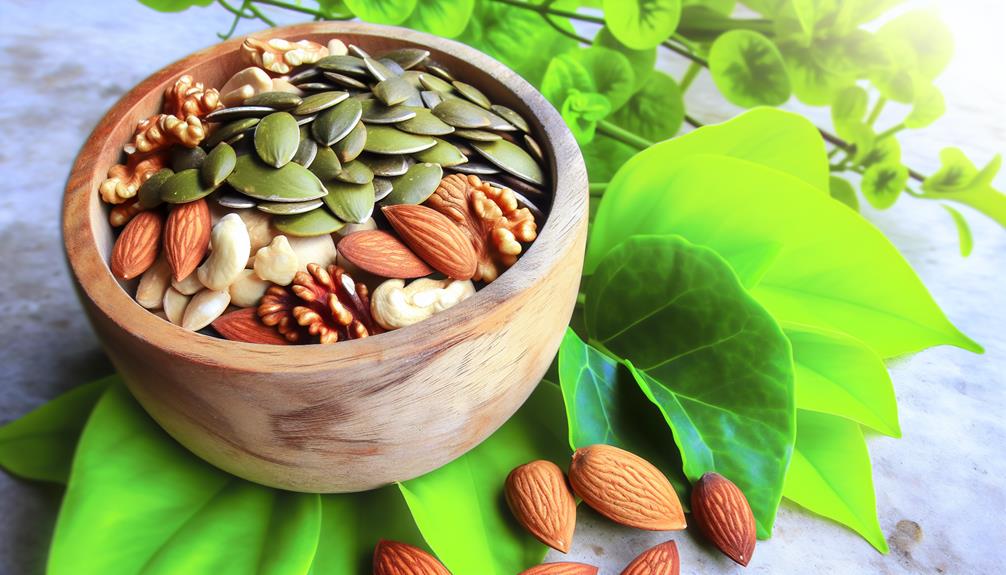I've discovered ten nutritional foods that can naturally support male hormones. Oysters are high in zinc, essential for testosterone. Fatty fish like salmon and mackerel are rich in omega-3s and vitamin D. Nuts, especially Brazil nuts and walnuts, provide healthy fats and selenium. Eggs are a complete protein source, packed with vitamins. Avocados offer monounsaturated fats for hormone production, while cruciferous vegetables help metabolize estrogen. Pomegranates are great for antioxidants, and olive oil supports overall hormonal balance. Dark chocolate adds delicious flavor and boosts testosterone. If you're curious about how to incorporate these foods, there's more on this topic!
Oysters

When it comes to boosting male hormones, I often turn to oysters as a top choice. These nutrient-dense mollusks are not just a delicacy; they're packed with beneficial compounds that can really support hormonal health. One of the standout features of oysters is their impressive zinc content. In fact, they're famously known as one of the richest sources of this essential mineral.
Why is zinc so important? Well, research shows that zinc plays a vital role in testosterone production. Low levels of zinc can lead to decreased testosterone levels, which can affect everything from energy levels to libido. By incorporating oysters into my diet, I'm not only indulging in a tasty treat but also giving my body a significant boost in zinc. Just six medium oysters can contain about 32 mg of zinc, far surpassing the daily recommended intake for men.
Additionally, the oyster benefits extend beyond zinc. They're also rich in other important nutrients like vitamin B12, omega-3 fatty acids, and antioxidants. This combination not only enhances hormone production but also supports overall health. I've found that including oysters in my meals—whether raw, grilled, or in a stew—adds variety while packing a powerful punch for my hormonal balance.
Spinach
After enjoying the benefits of oysters, I often turn to spinach as another powerhouse for supporting male hormones. Spinach is rich in nutrients that can enhance testosterone levels and overall hormonal health. With its high magnesium content, it plays an essential role in maintaining healthy testosterone levels. Research shows that magnesium can help increase free testosterone, making spinach a fantastic addition to my diet.
Here's a quick overview of some spinach benefits and delicious ways to incorporate it into your meals:
| Spinach Benefits | Spinach Recipes | Tips for Preparation |
|---|---|---|
| Boosts testosterone | Spinach smoothie | Use fresh or frozen spinach |
| Rich in magnesium | Spinach salad | Pair with nuts for extra crunch |
| Contains antioxidants | Sautéed garlic spinach | Cook briefly to retain nutrients |
When I'm in the mood for something revitalizing, a spinach smoothie with banana and almond milk is my go-to. For a quick meal, I love tossing spinach into salads, adding grilled chicken or chickpeas for protein. Sautéing spinach with garlic is a simple yet flavorful side dish that complements any entrée.
Eggs

Eggs are often hailed as a nutritional powerhouse, and for good reason. They're an incredible protein source, providing all nine essential amino acids that our bodies need for muscle repair and hormone production. When I think about incorporating eggs into my diet, I get excited about the numerous egg benefits that go beyond just protein.
One thing I appreciate is their rich vitamin content. Eggs are packed with vitamins D, B12, and A, which play an essential role in maintaining hormonal balance. Vitamin D is particularly beneficial for testosterone levels, making eggs a smart choice for men looking to support their hormonal health.
Now, let's address a common concern: cholesterol levels. While eggs do contain cholesterol, research suggests that for most people, moderate egg consumption doesn't greatly impact blood cholesterol. In fact, the healthy fats found in eggs can promote heart health when eaten in moderation.
When it comes to cooking methods, I like to keep it simple. Poaching or boiling eggs retains their nutritional value without adding extra fat, while scrambled or fried eggs can still be healthy if you use a minimal amount of oil. Just be mindful of portion sizes and how you prepare them.
Incorporating eggs into your diet is not only practical but also a delicious way to support your male hormones naturally. Whether you enjoy them in a breakfast scramble or as a protein-packed snack, eggs can be a versatile and nutritious addition to your meals.
Fatty Fish
Fatty fish, known for their rich omega-3 fatty acids, are fundamental for anyone looking to support their hormonal health. Incorporating these fish sources into your diet can provide essential nutrients that promote ideal testosterone levels and overall well-being. Omega-3s play a significant role in hormone production and regulation, making them a key player in male hormonal health.
Here are three of the best fatty fish options to take into account:
- Salmon: Not only is salmon a delicious choice, but it's also packed with omega-3s and vitamin D, which are linked to healthier testosterone levels.
- Mackerel: This oily fish is another great source of omega benefits. Mackerel is rich in nutrients like selenium, which has been shown to support male reproductive health.
- Sardines: These small fish are nutrient-dense and provide a powerhouse of omega-3s along with calcium and protein, making them excellent for maintaining hormonal balance.
Incorporating fatty fish into your meals a couple of times a week can greatly enhance your omega-3 intake. Whether grilled, baked, or added to salads, these fish sources can be both tasty and beneficial. Remember, the omega benefits are not just limited to hormonal health; they also support heart health and cognitive function. So go ahead and make fatty fish a regular part of your diet for better overall health!
Nuts and Seeds

In addition to fatty fish, nuts and seeds can greatly contribute to maintaining healthy male hormone levels. I've found that incorporating a variety of nut types and seeds into my diet not only enhances my meals but also supports my overall hormonal health.
Almonds, walnuts, and Brazil nuts are some of the best nut types for this purpose. For instance, Brazil nuts are rich in selenium, a mineral linked to testosterone production. Research indicates that just a couple of these nuts a day can considerably impact hormone balance. On the other hand, walnuts contain healthy fats and omega-3 fatty acids that may help reduce inflammation and support cardiovascular health, which is essential for ideal hormone function.
When it comes to seeds, pumpkin seeds are a powerhouse. They're packed with zinc, a mineral crucial for testosterone production. Including a handful of pumpkin seeds in my daily routine has not only improved my nutrient intake but also provided considerable seed benefits for hormone regulation. Chia seeds are another great option, as they're high in omega-3s and fiber, both of which can aid in balancing hormones and improving overall health.
Incorporating a mix of these nut types and seeds into my diet is an easy and delicious way to support male hormone levels naturally. Whether I toss them into salads, blend them into smoothies, or enjoy them as snacks, I know I'm making a positive impact on my hormonal health.
Avocado
I've found that incorporating avocados into my diet can be incredibly beneficial for hormone health. Their healthy fats support hormone production and regulation, which is essential for maintaining balance in the body. Plus, they're versatile and easy to add to meals, making them a practical choice for anyone looking to boost their nutritional intake.
Healthy Fats Benefits
While many people may shy away from fats, healthy fats like those found in avocados can play an important role in supporting male hormone levels. Incorporating these nutrient-dense foods into your diet can help maintain hormone balance, which is critical for overall health and well-being.
Here are three significant benefits of healthy fats from avocados:
- Improved Testosterone Production: Healthy fats are necessary for testosterone production. Including avocados in your meals can contribute to ideal hormone synthesis.
- Enhanced Nutrient Absorption: Healthy fats help the body absorb fat-soluble vitamins (A, D, E, and K). This means that when you consume avocados alongside other nutrient-rich foods, you're maximizing their benefits.
- Reduced Inflammation: The monounsaturated fats in avocados can help lower inflammation levels in the body. A balanced inflammatory response is fundamental for maintaining healthy hormone levels.
Hormone Regulation Support
Healthy fats like those found in avocados not only support testosterone production but also play an essential role in hormone regulation. As I've explored the nutritional benefits of avocados, I've come to appreciate how they contribute to maintaining hormone balance, which is vital for overall health.
Avocados are rich in monounsaturated fats and essential nutrients, such as vitamin E and potassium. These components help enhance the body's ability to produce testosterone, which can decline due to poor diet, stress, and age. By including avocados in my meals, I've noticed improvements in my energy levels and mood, likely due to the stability they provide in hormone levels.
Moreover, the fiber content in avocados helps regulate blood sugar levels, preventing spikes that can disrupt hormone balance. When I incorporate them into my diet, whether in salads, smoothies, or spreads, I feel more balanced and energized.
Ultimately, if you're looking to support your testosterone levels naturally, avocados are a simple and delicious addition to your diet. They not only taste great but also play a significant role in ensuring your hormones function effectively.
Cruciferous Vegetables

When I think about foods that can support hormone regulation, cruciferous vegetables immediately come to mind. These veggies, like broccoli and kale, are rich in antioxidants and fiber, which are essential for maintaining healthy digestion and hormone balance. Incorporating them into my diet has been a practical choice for overall well-being.
Hormone Regulation Benefits
Cruciferous vegetables, such as broccoli, kale, and Brussels sprouts, offer significant hormone regulation benefits that can be particularly advantageous for men. I've found that incorporating these nutrient-dense foods into my diet can help promote testosterone balance and foster hormonal harmony. Here are three key benefits I've discovered:
- Estrogen Metabolism: Cruciferous vegetables contain compounds like indole-3-carbinol, which support the liver's ability to metabolize estrogen effectively. This helps maintain a healthy balance of hormones.
- Anti-Inflammatory Properties: These veggies are rich in antioxidants and anti-inflammatory compounds. Reducing inflammation can lead to better overall hormonal function, which is essential for maintaining testosterone levels.
- Nutrient Density: Packed with vitamins C, E, and K, along with essential minerals, cruciferous vegetables nourish the body. Proper nutrition directly contributes to hormone production and balance, ensuring that the body functions efficiently.
Rich in Antioxidants
There's no denying that incorporating cruciferous vegetables into my diet has made a noticeable difference in my overall health, particularly due to their high antioxidant content. These vegetables, like broccoli, kale, and Brussels sprouts, are excellent antioxidant sources that help combat oxidative stress in the body. Research shows that antioxidants play a significant role in reducing inflammation and supporting hormone balance, which is essential for male health.
One thing I've learned is that the way I prepare these veggies can greatly impact antioxidant absorption. For instance, lightly steaming them tends to enhance their bioavailability, making it easier for my body to utilize those beneficial compounds. Raw cruciferous vegetables are nutritious, but cooking can release even more antioxidants.
Additionally, pairing these vegetables with healthy fats, like olive oil or avocado, can further improve nutrient absorption. It's a practical tip I've adopted—drizzling some olive oil on my steamed broccoli not only enhances the taste but also boosts the health benefits. By focusing on cruciferous vegetables, I feel like I'm making proactive choices for my hormone health while enjoying delicious meals.
Fiber and Digestion
Incorporating cruciferous vegetables into my meals not only boosts my antioxidant intake but also greatly supports my digestive health due to their high fiber content. These veggies, like broccoli, Brussels sprouts, and kale, are excellent fiber sources that promote gut health and enhance the activity of digestive enzymes. They serve as prebiotic foods, which means they feed the beneficial bacteria in our intestines, contributing to digestive balance.
Here are three key benefits of cruciferous vegetables for digestion:
- Enhanced Fiber Intake: The high fiber content helps prevent constipation and encourages regular bowel movements, promoting colon health.
- Bloating Remedies: Eating these vegetables can help reduce bloating, especially when paired with adequate hydration and other fiber sources.
- Probiotic Benefits: By supporting the growth of good gut bacteria, they can improve overall gut flora, enhancing the effects of probiotics.
Incorporating these vegetables into my diet not only aids digestion but also contributes to overall well-being. For better digestion, I recommend experimenting with cooking methods like steaming or stir-frying to help break down tougher fibers while retaining their nutrients.
Pomegranates
Pomegranates are often hailed as a superfood, and for good reason. This delicious fruit is packed with nutrients that can support male hormone levels naturally. Research shows that pomegranates are rich in antioxidants, particularly punicalagins, which help combat oxidative stress. This is essential because oxidative stress can negatively impact hormone production and overall health.
One of the standout pomegranate benefits is its potential to boost testosterone levels. Studies suggest that regular consumption of pomegranate juice can increase testosterone levels in men, enhancing libido and overall vigor. Incorporating pomegranates into your diet could be a simple yet effective way to support your hormonal health.
If you're wondering how to enjoy this nutritious fruit, there are plenty of pomegranate recipes to choose from. I love adding fresh pomegranate seeds to my morning yogurt or oatmeal for a flavorful and nutrient-rich boost. You can also toss them into salads for a invigorating crunch. Another favorite is a homemade pomegranate dressing, which combines pomegranate juice with olive oil, honey, and a splash of vinegar. It's a delicious way to elevate your meals while reaping the benefits of this superfood.
Incorporating pomegranates into your diet is easy and versatile. Whether you enjoy them whole, as juice, or in recipes, they're a tasty addition that can help support your male hormones naturally. So why not give them a try? Your body will thank you!
Olive Oil

When I think about boosting male hormone levels, olive oil often comes to mind due to its impressive health benefits. Rich in omega-3 fatty acids, it supports heart health while also providing powerful antioxidant properties that can combat oxidative stress. Incorporating olive oil into my diet is a simple way to promote hormonal balance and overall well-being.
Health Benefits of Olive Oil
Many people may not realize just how beneficial olive oil can be for male hormones. It's more than just a tasty addition to salads; it can play a significant role in hormone health. Here are three key olive oil benefits I've found particularly significant:
- Supports Testosterone Levels: Studies suggest that olive oil may help increase testosterone levels, contributing to better energy and liveliness.
- Promotes Heart Health: Healthy blood circulation is essential for hormone production, and olive oil is known for its heart-healthy properties, thanks to its high content of monounsaturated fats and antioxidants.
- Reduces Inflammation: Chronic inflammation can negatively impact hormone balance. The anti-inflammatory compounds in olive oil can help mitigate this issue, promoting overall hormonal health.
Incorporating olive oil into your diet is simple. You can drizzle it over roasted vegetables, use it in marinades for grilled meats, or create delicious salad dressings. There are endless olive oil recipes that not only taste great but also support your hormonal health. So, don't underestimate the power of this liquid gold—your body will thank you for it!
Omega-3 Fatty Acids
Including omega-3 fatty acids in your diet can markedly enhance your hormonal health, particularly when combined with olive oil. Omega-3s are essential fats that our bodies can't produce on their own, so it's vital to include omega 3 sources in our meals. Fatty fish like salmon, mackerel, and sardines are excellent options, but I also love incorporating flaxseeds and walnuts into my diet for a plant-based approach.
The omega 3 benefits are extensive, especially for men's hormonal balance. These fatty acids can help lower inflammation, which is key in supporting testosterone levels. Studies suggest that adequate omega-3 intake may enhance testosterone production and improve overall hormonal function. Plus, when I drizzle olive oil over my salads or use it in cooking, I'm not just enjoying a delicious flavor; I'm also amplifying the health benefits linked to omega-3s.
To maximize these benefits, I try to consume a mix of omega 3 sources regularly. Whether it's through a hearty fish dish or a sprinkle of flaxseeds on my morning yogurt, the combination of omega-3s and olive oil is a powerhouse for my hormonal health.
Antioxidant Properties Explained
Incorporating omega-3 fatty acids into my diet has not only benefited my hormonal health but also led me to explore the remarkable antioxidant properties of olive oil. This liquid gold is one of the most potent antioxidant sources available, packed with polyphenols that combat oxidative stress. This is essential since oxidative stress can negatively impact hormone production and overall health.
Here are three key health benefits I've discovered about olive oil:
- Supports Heart Health: The antioxidants in olive oil help reduce inflammation, lowering the risk of heart disease.
- Enhances Hormonal Balance: By protecting cells from damage, olive oil supports the endocrine system, promoting healthier hormone levels.
- Improves Skin Health: The antioxidant properties can also improve skin elasticity and hydration, giving me a youthful glow.
Incorporating olive oil into my meals—whether in salads, cooking, or drizzling over dishes—has become a simple yet effective way to harness these health benefits. With its rich flavor and versatility, I feel confident that I'm making a positive impact on my hormonal health every day.
Dark Chocolate
There's something delightful about dark chocolate that goes beyond its rich flavor; it also offers potential benefits for male hormones. Studies suggest that the flavonoids found in dark chocolate can contribute to improved testosterone levels. This is particularly exciting, as maintaining healthy testosterone levels is essential for overall male health, energy, and mood.
When I indulge in dark chocolate, I often opt for varieties that contain at least 70% cocoa. Not only do these options provide more antioxidants, but they also deliver a more robust flavor, making them a satisfying treat. The dark chocolate benefits extend beyond hormone support; it also aids in cardiovascular health by improving blood flow and reducing inflammation. This can create a positive feedback loop, as better circulation can support hormone function.
If you're looking for ways to incorporate dark chocolate into your diet, there are plenty of delicious dark chocolate recipes to explore. For instance, you could whip up a simple dark chocolate mousse using avocado and cocoa powder for a creamy, healthy dessert. Or, try adding dark chocolate shavings to your morning oatmeal or yogurt to give your breakfast a tasty twist.
Incorporating dark chocolate into your diet doesn't just feel indulgent; it can also support your hormonal health. Just remember to enjoy it in moderation, as excess sugar and calories can counteract the benefits. So, go ahead and treat yourself to some dark chocolate—it might just be a sweet way to support your well-being!
Frequently Asked Questions
How Do Lifestyle Factors Impact Male Hormone Levels?
Did you know that studies show nearly 40% of men experience low testosterone by age 45? I've found that lifestyle factors like dietary habits and exercise routines play a huge role in hormone levels. Eating a balanced diet rich in healthy fats and proteins can boost testosterone. Regular exercise, especially strength training, also helps maintain healthy hormone levels. It's fascinating how simple lifestyle choices can greatly impact our overall hormonal health!
Can Supplements Replace These Nutritional Foods?
I often wonder if supplements can truly replace nutritional foods, and the evidence suggests they can't fully do the job. While supplements can boost nutrient intake, they often lack the synergistic benefits of whole foods. It's essential to maintain dietary balance for ideal health. Supplement efficacy varies greatly among individuals, so I prioritize real foods to support my well-being. Ultimately, I believe a balanced diet is irreplaceable for achieving lasting results.
What Symptoms Indicate Hormonal Imbalances in Men?
When I think about hormonal imbalances in men, I recognize several key symptoms. These can include fatigue, weight changes, mood swings, and decreased libido. It's vital to pay attention to these signs, as symptom recognition can guide us toward hormonal testing. By addressing these symptoms early, we can better understand our hormonal health and take appropriate steps to restore balance. Trusting our instincts and seeking professional help is essential for overall well-being.
Are There Specific Foods to Avoid for Hormone Health?
When it comes to hormone health, I've found that avoiding certain foods is essential. Processed sugars can spike insulin levels, leading to hormonal imbalances, while unhealthy fats, like trans fats found in many fried and packaged foods, can disrupt hormone production. I've noticed that cutting back on these foods not only improves my overall well-being but also supports a healthier hormonal balance. Staying informed about what I eat has made a significant difference.
How Often Should I Consume These Foods for Best Results?
I've found that meal timing and food combinations can greatly impact how my body responds to nutrients. For best results, I try to consume supportive foods consistently throughout the week, aiming for at least three to five times. Pairing them with healthy fats or proteins enhances absorption, so I'm mindful of how I arrange my meals. By keeping a balanced approach, I feel more energized and in tune with my body's needs.
